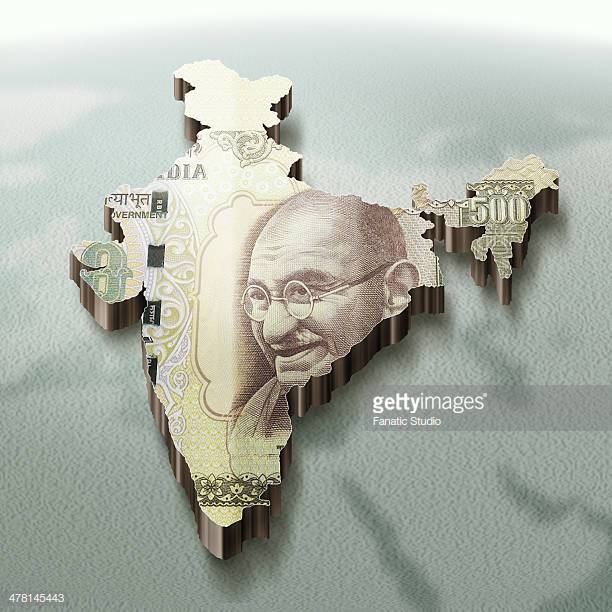India and Mohandas K. Gandhi – The Third Wise Man

“In a gentle way, you can shake the world.” – Mahatma Gandhi
Dear readers, I’d like to share a passage I read in Dr. Subhash Sharma’s 2007 book, New Mantras in Corporate Corridors. It reads:
“Metaphor of three wise men walking in corporate corridors. Wiseman walking in the corridor on its right side is Adam Smith emphasizing the importance of efficiency, bottom line. Wiseman walking on the left side is Karl Marx, emphasizing the importance of the equity. These two wise men are following the third wise man viz, Gandhi who is emphasizing importance of ethics with focus on means.”
A few days ago, I was pleasantly surprised. I had received an unexpected package from a friend. Opening the package I found a book, Mohandas K.Gandhi, Autobiography, The Story of My Experiments with Truth and a note attached that read:
Dear Leticia, I enjoy reading your papers drawing inspiration from American, English and Chinese great figures and philosophers on the subjects of truth and wisdom. But, I think you may have overlooked Gandhi.
My friend was right. In fact, his pointing this out reminded me of a gentleman I met a decade earlier, Dr. Subhash Sharma. Dr. Sharma is the Director at Indus Business Academy, Bangalore, Bengaluru Area, India. Dr. Sharma too had recommended a book, New Mantras in Corporate Corridors.
I met Dr. Sharma on May 28, 2008 at The India Trade Seminar in Los Angeles, California. I know the exact date because after our conversation, he was kind enough to give me his book as a gift. Dr. Sharma was a keynote speaker and after his talk, I placed a copy his speech inside the book. I found his talk and book very insightful and prescient of what was to come. More importantly, the key role India plays in what he called the “mantra of ‘holistic globalization.” I will share with you some of his words:
Dear Friends,
Now we are witnessing the opening of the Eastern doors through new business opportunities…a new word has come into currency viz. Chindia that stands for opportunities in China and India.
The recent success of India is primarily due to convergence of three … “NPK” factors: “N stands for ‘Nose for Business’…P, Professional excellence…of engineers, medical doctors and MBAs etc…K, Knowledge seeking ethos…knowledge workers and the Indian Techies.”
Dr. Sharma’s speech impacted me in the sense that I was witnessing his words play out in front of me, at universities and “corporate corridors.” At the time, I was assisting a team of professors at the Paul Merage School of Business and working with “techies” at the Office of Information Technology, UC Irvine. Previously, I had worked in the private sector with computer hardware engineers, manufacturers of medical-technical products, and financial investors.
Who Will Be the Next “Corporate Rishi”?
U.S. Trade discussions in Washington bring to mind Dr. Sharma’s book and the “metaphor of three wise men.” In May of 2008, Dr. Sharma posited that “to achieve a sustainable balance we need a new leadership model…as CEO leader wherein CEO stands for Creative Enlightened Organic leader…a Corporate Rishi i.e. a leader who has high ‘re-see competence’.
Dr. Sharma went on to say that “during recent times the US has produced many such Corporate Richis.” This, of course, points to presidents leading up to the 43rd President Bush, before Obama and Trump. We have yet to see if the latter meet such ideal as their domestic and foreign policies have yet to be proven successes or failures.
Though Dr. Sharma did not specify a leader, I would argue that neither Bush Presidents or Obama and Trump are deserving of such honors. It seems to me that “Corporate Richis” were produced in past times. Theodore Roosevelt meets the criteria as “Such a leader can see and re-see events, opportunities and threats in many new ways.” Roosevelt has come to be known for his regulation enforcement bravely taking swift action toward monopolistic corporations.
U.S. President Trump’s leadership model does not reflect Dr. Sharma’s ideal of a “Corporate Rishi.” I’d argue that Trump’s proposed trade policies, as they stand, will not “achieve a sustainable balance.” The U.S.-Canada-Mexico trilateral relationship is met with disruptions from U.S. economic and national security issues. Though of a different nature, U.S.- China trade relations writhe of similar issues. U.S. is finding it hard to reconcile depending on China and policing China in its futile attempts to guard itself from espionage and IP theft.
Unlike Trump’s proposed closed border policy, open borders facilitated the growth of China’s “world factory” and early technology transfers between the West, China, and India. Strategic India-China bilateral trade has prompted India to revisit its past mantra of “mutual accommodation and mutual benefit” vis-à-vis Chinese investments in “e-commerce…transportation and fintech.”
The Future of the “Professional”?
From its “corporate corridors,” India’s innovative “world tech lab” has reaped the seeds of its ventures at home as in the U.S. where venture capitalists provided business incubators for “gurus” or entrepreneurs developing startup networks.
Long-standing connection between China’s “silk road” and the “pearl” of India’s trading center continues to thrive. Moreover, India’s early tech transfer with the U.S. provided crews of knowledgeable experts ready to position themselves at selected start-ups or tech companies.
Dr. Sharma attributed India’s successes to “convergence of three … “NPK” factors.” And this may have been the case. Still, for all of India’s “nose for business”, it may likely be challenged by what I see as EPT factors: economic crises, population demographics, and the implications of emerging technologies like A.I.
The professionals “engineers, medical doctors and MBAs etc.” though still existent, may not be in high demand, at least not in the traditional sense. Most sectors continue to be revamped and the “new business opportunities” Dr. Sharma spoke of a decade ago are being discovered elsewhere. Ironically, the “techies” have outnumbered and outworked its fellow professionals.
I agree with Gandhi’s quote above. Still, when the world is being disrupted by swift forces and shaking you, it may be best to grab ahold of something solid, gain your bearings, and build your strength before you start to walk again. Then consider the “three wise men” and watch which side of the “corporate corridors” you’re walking on and who to follow: bottom line, equity, or focus on means.
